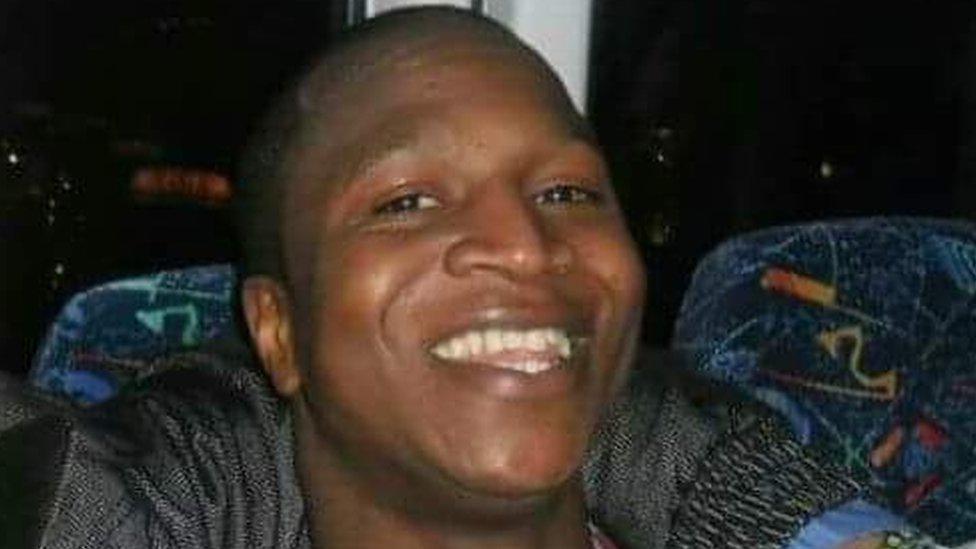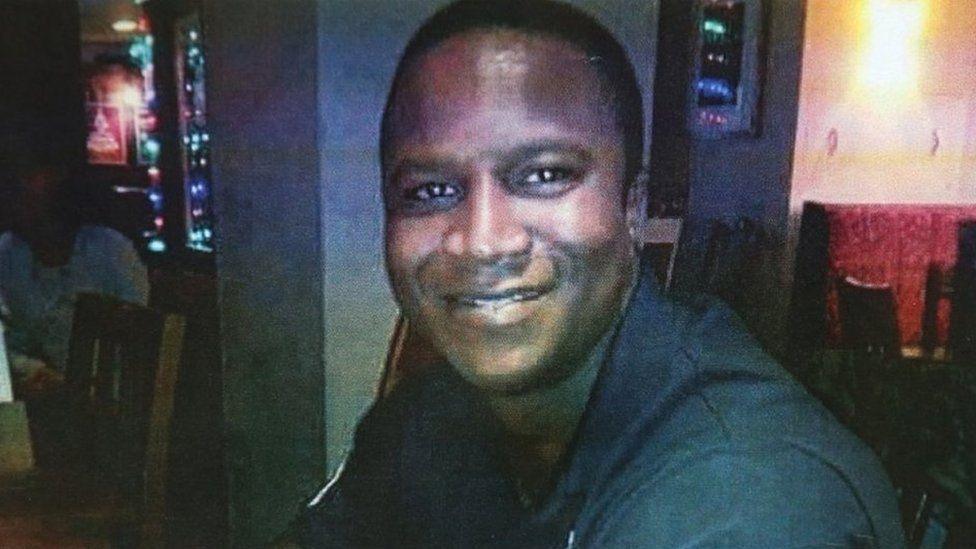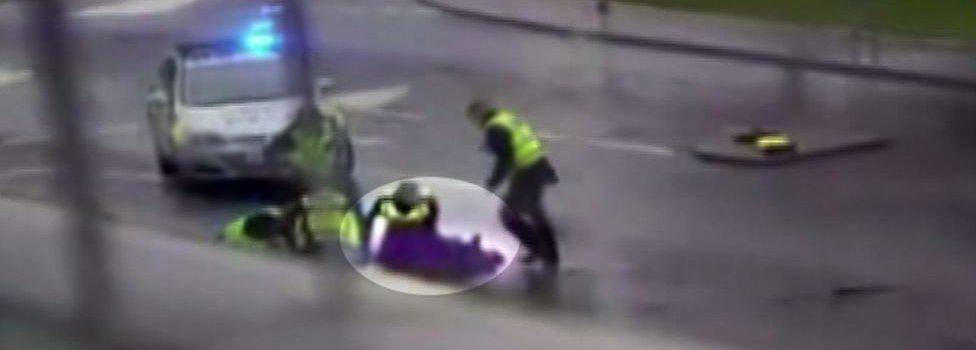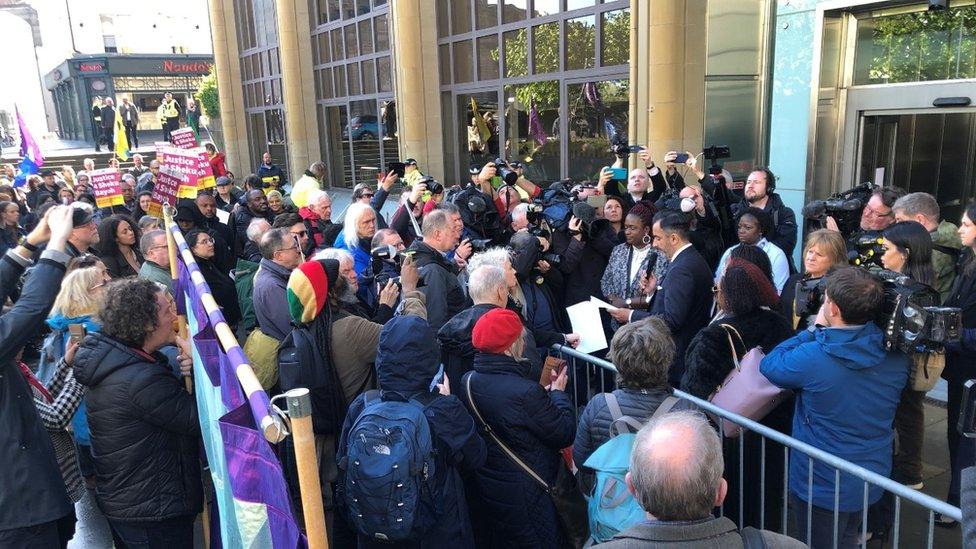Sheku Bayoh: Chief constable says Police Scotland must be anti-racist
- Published

Sheku Bayoh was restrained on the ground for five minutes before falling unconscious
Police Scotland needs to become "anti-racist", chief constable Iain Livingstone has told the inquiry into the death of Sheku Bayoh.
Mr Bayoh, 31, died in police custody after being restrained by officers in Kirkcaldy, Fife, in May 2015.
His family has said they believe race played a part in his death.
Mr Livingstone's statement on racism and policing in Scotland was heard during opening statements at the public inquiry in Edinburgh.
Maria Maguire QC, who is representing Mr Livingstone, said he was determined that under his leadership, it would become "an actively anti-racist service".
She said: "The chief constable is sending a very clear and strong message that if you hold racist, misogynist or discriminatory views, you are unwelcome in policing.
"It is imperative that progress is made. Words and good intent are not enough. There will be action, practical, firm, progressive, visible action.
"The chief constable is aware that it is not enough to be alert to racism and deal with it on a case-by-case basis.
"Nor is it enough simply to be non-racist. Police Scotland needs to be anti-racist."

Sheku Bayoh died in police custody in 2015
She said Mr Livingstone was "powerfully affected" by words of Mr Bayoh's sister, Kadi Johnson, who yesterday told the inquiry that she felt unsafe in Scotland after his death.
The inquiry heard that Mr Livingstone believed Police Scotland should seek to challenge the existence and workings of racism at all levels - personal, cultural, and institutional.
Ms Maguire added: "The question of whether or not race or perceived race plays any part in what happened to Mr Bayoh is a serious and grave matter for policing in Scotland and its relationship with the public.
"The chief constable reaffirms his public position that racism or discrimination of any kind is utterly deplorable, completely unacceptable, and should have no place in society and no place in policing."

The death of Sheku Bayoh

Mobile phone footage of police restraining Sheku Bayoh was obtained by BBC Panorama
Police were called out in the early hours of 3 May 2015 after Sheku Bayoh was seen behaving erratically with a knife in a Kirkcaldy street. He had earlier taken drugs which friends said altered his behaviour.
According to police statements, when officers arrived he no longer had the knife, but failed to obey instructions to get down on the ground.
The officers used force on Mr Bayoh, including CS Spray and batons. He then punched PC Nicole Short, who fell to the ground.
Two officers, PC Craig Walker and PC Ashley Tomlinson, later told investigators that Mr Bayoh carried out a violent stamping attack on PC Short. However, evidence obtained by the BBC's Panorama programme suggested these accounts may have been false.
Mr Bayoh was restrained for five minutes before falling unconscious. He was pronounced dead in hospital a short time later.

The public inquiry was announced in 2019 after it was confirmed there would be no criminal charges in Mr Bayoh's case.
It also heard from lawyers representing the officers who restrained Mr Bayoh. Alan Paton was one of the nine involved.
Brian McConnachie QC, representing Mr Paton, said the former police officer was "impacted significantly" by the incident.
He said Mr Paton retired from Police Scotland due to "ill health" and has been diagnosed with post-traumatic stress disorder.
The lawyer said Mr Paton denied allegations that police decisions and actions in the build up to Mr Bayoh's death were impacted by the colour of his skin.

Mr Bayoh's family appeared at the inquiry with solicitor Aamer Anwar
Roddy Dunlop QC, representing retired PCs Nicole Short and Constable Craig Walker, said Ms Short had been rendered "permanently disabled" from injuries she sustained the day of Mr Bayou's death.
Mr Dunlop said: "The human interest in the welfare of those officers has largely been ignored since May 2015.
"Their reputations have been tarnished, they will forever be associated with the death of Mr Bayoh, the accusations of racism, the accusations of brutality levelled against them.
"Ms Short and Pc Walker are confident that these accusations are not fairly directed at them. They were simply doing their duty in trying and traumatic circumstances."
Claire Mitchell QC, representing the Bayoh family, told the inquiry they have experienced institutional failure which began with a failure to preserve the life of Mr Bayoh and thereafter properly to investigate his death.
She said: "Police officers, Police Scotland, the Police Investigations and Review Commissioner, the Scottish Police Federation and Crown Office all have difficult questions to answer.
"Now is the time for the truth about the death of Sheku Bayoh to emerge."
The inquiry, chaired by Lord Bracadale, continues.